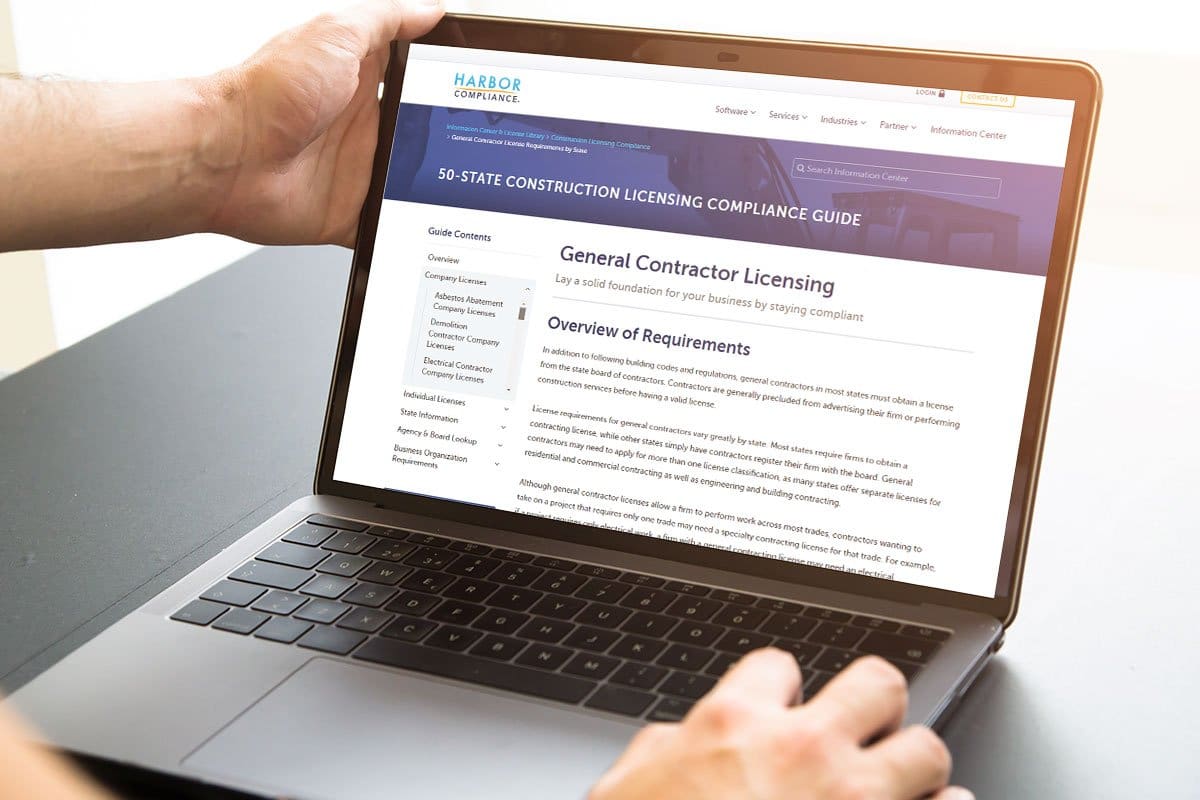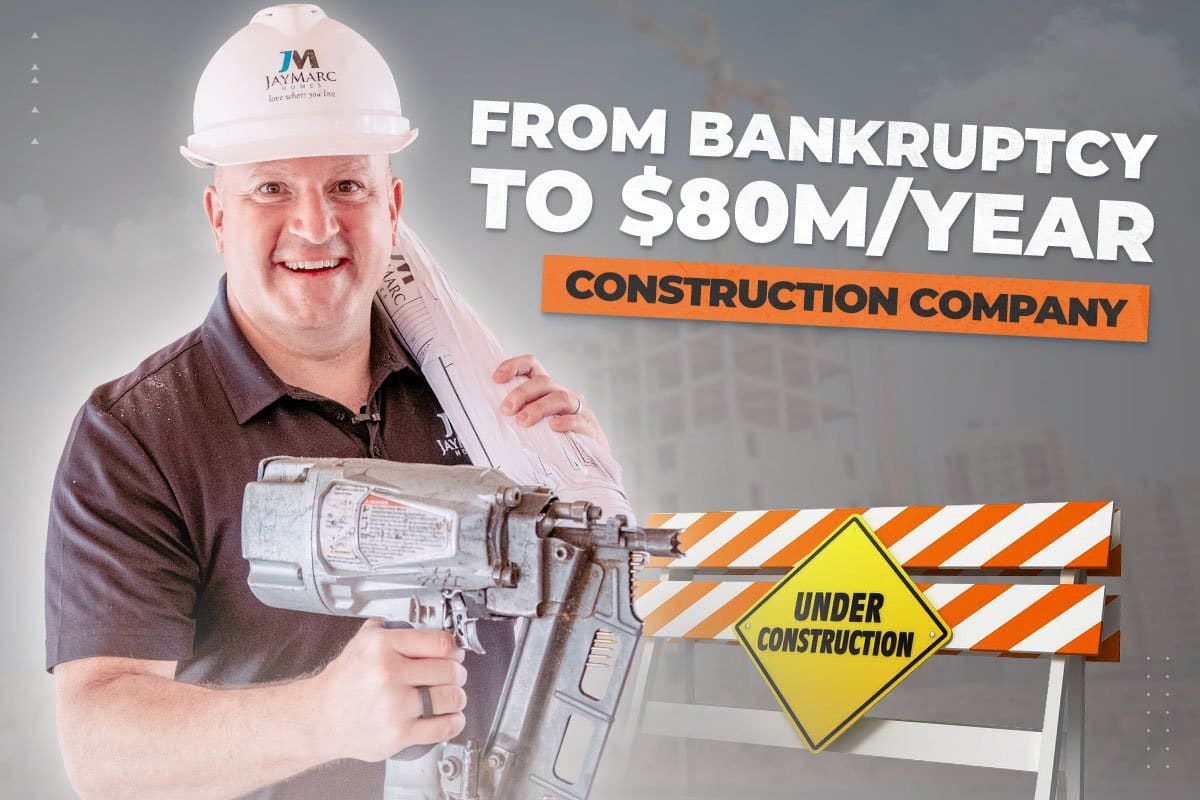Have you ever wondered how to start a construction company but hesitated because you don’t have business experience or a previous business failed?
Marc Rousso knows what it’s like. His real estate business failed during the 2009 recession and left him owing the bank $2.5 million after liquidating everything. But within seven years, he grew JayMarc Homes into a construction company that makes $80 million annually, and he’s already paid off all the debt from his prior business.
We combine his insight with industry research to share everything you need to know to get into contracting (even if you have no money to invest).
How to start a construction company
We’ll cover each of the following topics. Read from start to finish or click any link to jump to the step you need help navigating right now.
- Learn about the construction industry.
- Decide how to start your own construction company.
- Write a construction company business plan.
- Choose a construction company name.
- Learn how to open a construction company.
- Set up your construction business finances.
- Establish safety protocols.
- Get equipment and supplies.
- Hire employees.
- Consider how to grow a construction business.
- Document your own business processes.
Step 1. Learn about the construction industry

- How much do construction companies make? According to IBISWorld Report 23, the average company makes around $696K in revenue, but JayMarc Homes makes approximately $80 million per year.
- How much do construction company owners make? The profit margin for construction work is 3.4% before taxes, which means that the average small business owner makes approximately $23,664 in profit plus any salary they take from contracting.
- How many construction companies are in the U.S.? There are over 3.8 million construction companies in the United States, with an average of 2.63 employees.
- What is the most profitable construction niche? Land developers have the most profitable niche with an average pre-tax margin of 17%, followed by remodeling and excavation at 7.2%. Check out the table below for other segments’ profit margins.
- How to start a construction company with no experience: Starting a construction company with no experience may be a challenge. The average home requires 22 subcontractors to build a house, so you’ll need lots of basic knowledge and soft skills to manage a contracting company without experience.
- How to start a construction company with no money: You can always book jobs and then rent the equipment needed to complete the job. Reinvest the profits into the business to reduce your costs over time.
- How much does it cost to start a construction company? Marc started his contracting business with around $15K. But other construction companies have started with much less. In fact, the VP Homes CEO entered the construction industry with $80 of tools and is now making $1.2 million per year.
- What skills do I need to own a construction business? You must understand building materials, each subcontracting field, and safety requirements. You might also need certifications depending on your niche.
| Construction Niche | Pre-Tax Profit Margin |
| Land Developers | 17% |
| Remodeling | 7.20% |
| Excavation | 7.20% |
| Concrete | 7.10% |
| Swimming Pool Construction | 7% |
| Electricians | 6.20% |
| Apartment & Condo Construction | 6.20% |
| Transmission Line Construction | 6.10% |
| Home Builders | 6.00% |
| HVAC | 5.30% |
| Roofing | 5.30% |
| Road & Highway | 5.20% |
| Heavy Engineering Contractors | 3.20% |
| Plumbing | 3.20% |
| Commercial Builders | 3.10% |
| Industrial | 2.80% |
Pro Tip: Subscribe to construction industry publications and local industry publications to keep updated on trends in your industry. Check out some of the popular industry organizations.
Case Study: JayMarc Homes
JayMarc Homes focuses on building custom homes. It was their second construction business after a company closure. They currently make about $80 million in revenue annually with a 10% profit margin, but Marc warned:
Check out our interview with Marc below:
Next, you’ll want to decide how to start a construction company.
Step 2. Decide how to start your own construction company
People who want to start contracting and construction companies have two main options:
- General contracting
- Subcontracting
Find out more about how to start a construction company as each of these types of contractors.
What is a general contractor?

A general contractor is the primary contact between a property owner and the construction project. Their role includes:
- Creating and managing the construction budget
- Hiring, managing, and paying subcontractors
- Working with the architect to implement and revise design specifications
- Maintaining project schedule and timing
- Scheduling inspections
- Making payments to vendors and specialty contractors
- Collecting and tracking lien waivers
- Managing post-construction issues with warranties and payments
How to start a general contracting business
Starting a general contracting business will normally require some or all of the following:
- time in the field
- education in the field
- passing an exam
- background checks
- security bonds
Find your state’s licensing requirements for how to start a small construction business as a general contractor.
What is a subcontractor?
Subcontracting businesses are normally construction services focused on specific trades like HVAC, plumbing, electrical, roofing, carpentry, or other fields with specialized construction equipment or tools. The bigger specialty contractors may also compete as general contractors.
For instance, when I worked at Honeywell, we would compete for both HVAC and general construction work when bidding on government contracts for new federal, state, and local projects.
There are plenty of business ideas in the construction industry to consider. Check out our courses here. The cleaning business, pressure washing, and flooring courses will all guide you toward success in the construction industry.
Once you’ve decided whether you want to be a general contractor or a subcontractor, you’ll want a business plan to guide you through the process of how to start a construction company and succeed.
Step 3. Write a construction company business plan
You’ll need a construction business plan to be successful.
A solid business plan includes:
- Contracting insurance information
- Competitive analysis
- Construction equipment list
- Financial projections
- Location details
- Licenses and permits
- Marketing plan
- Money-making strategies
Pro Tip: Our business plan guide walks you through writing a business plan and includes a free template for getting your business plan in order.
We can’t discuss how to start a construction company without discussing choosing a business name…
Step 4. Choose a construction company name

Choosing a name can be exciting! Consider the following tips when choosing a construction business name:
- Add your details: JayMarc Homes communicates what field the business entity is in, though it could also be a real estate business.
- Easy and clear: JayMarc Homes might be changed to JayMark by potential customers. When it comes to getting a website, I would buy both domains, just in case.
- Location: Construction companies can rank higher in search results with a business name that includes the city name.
- Branding: A new construction company will have other branding elements. How will they tie in with your new business name?
Pro Tip: Try out our construction business name generator. Find a name that ensures your business’s future success and click on it to buy the domain.
Next, we’ll discuss how to start a contracting business legally.
Step 5. How to open a construction company
After writing a business plan, you’ll need to establish a legal structure. While some businesses can get away without creating a business entity, it is legally necessary for a local construction company.
Building companies should consult with a business lawyer to make sure they comply with all the laws that govern small construction companies in their area.
Your new construction builder will likely need assorted licenses, permits, insurance, and tax forms. Find out what you’ll need from the Small Business Administration (SBA) and Municode Library.
Business structure for construction companies

Construction companies need to create a separate legal entity to keep company property and personal assets separate. Most construction companies will form one of the following structures through their state’s Secretary of State website:
- S-Corporation: Best for high-earning companies that want to lower business owner taxes. A limited number of stockholders, provides personal liability protection, requires business owners to receive a salary (and optional dividends), no double taxation.
- C-Corporation: Best for companies trying to change the world. Unlimited stockholders, provides personal liability protection, high compliance costs, and double taxation. Business owners can earn money through multiple income streams with different tax codes.
- Limited Liability Company: Best for companies that want to separate business entities from personal assets. Provides limited liability, pass-through income, and no double taxation.
Pro Tip: To learn more about business structures, check out our blog on 11 structure options.
You’ll also want to get your business licensed. Some states let you do it all at once. Don’t forget to grab an employer identification number (sometimes called a federal tax ID) from the IRS. It’s used for payroll and business taxes when starting a contracting business.
What licenses are needed to start a construction business?
A successful construction business will need different business licenses depending on your location and business plan. There are main categories of business licenses for a contractor business: general contractor’s license or subcontractor license. Check with local industry associations and the state and local government for more information.
Next, you’ll need to thing about finances as you learn how to start a construction company.
Step 6. Set up your construction business finances

Financial management is an essential part of how to start your own construction business. Once you arrive at this step, you should already know your budget, but let’s look at how to:
- Get a business bank account
- Get small business insurance.
- Secure funding
- Create a pricing structure
Business bank account
To run a successful business, you need to open a business bank account because you need to separate your business and personal finances and assets. Business bank accounts can be either online or from brick-and-mortar (legacy) banks and credit unions.
Online banks tend to have better offers, but they might not have as broad a range of business credit card accounts and service offerings as the legacy banking system. If credit accounts or making cash deposits are important to you, go with the legacy banks. Learn more from our business bank account guide.
Get business insurance
You’ll want to get business insurance, including:
- General liability insurance: Covers against customer injuries
- Property insurance: Protects the business owner from expenses due to property damage
- Workers compensation insurance: Pays employees for lost wages and medical bills when they get hurt
- State disability insurance: Covers against full or partial disability
- Unemployment insurance: Covers former employees who are laid off
- Commercial vehicle insurance: Covers against accidents when driving
Pro Tip: Consider Simply Business to get the most competitive general liability insurance quotes for your business.
Funding

The contracting industry doesn’t cost a lot to get into, but funding is an essential part of starting a successful business. You might consider:
- Small business loans (including SBA loans)
- Equipment loans
- Angel investors
- Business partners
- Credit cards
- Crowdfunding
- Government programs
- Home equity loan
- Friends or family
- Personal finance through savings or wages
- Rollover for business startups (ROBS)
Each method has its pros and cons. For example, SBA loans may be a good way for a new business to get a business loan because they typically have better interest rates than any other business loan. That said, the interest could start accruing before your first building is complete.
A business line of credit only charges interest on the money you use, making it a cost-effective way to fund your own construction company.
Pro Tip: National Business Credit is our preferred business financing partner.
Pricing structure
A construction company will have different ways of pricing. Some of the common ones are:
- Time and materials: You charge based on the time and materials used for the construction project.
- Flat rate: Charge an all-inclusive fee.
- Market value: If you’re designing and building a home, you might sell the property at market value. This can have huge profit margins if you can purchase materials for less than most local companies.
We cant talk about how to start a construction company without reminding you there are lots of safety laws you need to follow
Step 7. Establish safety protocols

Occupational Safety and Health Administration (OSHA) governs workplace safety and has special requirements about how to run a construction company. Supervisors will need the OSHA 30 certification. There are also personal protective equipment requirements for each trade.
Take OSHA requirements seriously to keep all parties safe from injury, fines, and legal action.
You’ll need to get equipment because it’s a crucial aspect of how to start a construction company.
Step 8. Get equipment and supplies
Construction businesses need lots of equipment and supplies, including:
- Personal Protective Equipment (PPE): Hard hats, safety vests, safety goggles, lockout-tagout equipment, and eye protection
- Project Management Software: You’ll need construction management software like Hubspot.
- Heavy Machines: You might need excavators, dump trucks, cranes, concrete mixers, and other machinery.
- Hand Tools: You’ll need various tools depending on your specialization, but most construction workers will need at least a hammer and screwdrivers.
- Power Tools: Buy or rent drills, saws, and other power tools to make your construction jobs faster and easier.
- Specialty Equipment: Each field in the construction industry will need different tools. Make sure to research the crucial tools for your industry.
Check out our interview with Avanni Petras to find out how he dealt with the cost of equipment when he started Petras Homes on a shoestring budget.
When you think about how to start a construction company, are you thinking about having employees? If you are check out our next section.
Step 9. Hire employees
Hiring employees in the construction industry is a crucial aspect of how to start a home-building company. We asked Marc how many employees they have and he told us:
Marc described some of the ways they help make JayMarc Homes a great place to work. He told us:
- During the first week, we don’t send them out to the field. We help them get to know everyone so they feel like they are part of the family.
- We have them read the book Exceptional Service, Exceptional Profit. It helps align new employees with quality services and business strategy.
- Once everyone gets to know the new employees, we get together and tell them positive adjectives that describe them — it builds them up and lets them know how amazing we think they are.
- Then, we do a naming ceremony where we establish team names.
He also told us
Pro Tips: It helps if the people you hire possess technical skills, but they can be taught. Here’s a great new hire checklist for a contracting business.
Step 10. Consider how to grow a construction business
JayMarc Homes holds webinars where they teach people about the aspects of custom home building and home ownership.
Marc specifically recommends identifying your niche and mastering it. He told us:
Market research: Identify your customer
Hopefully, you did some market research about your target market when writing your business plan, but if you didn’t, it’s time for market research now. Small businesses in the construction industry might specialize in specific construction areas like remodeling. In Marc’s case, they have three primary customers they identify:
- High-end home buyers: The target audience for the homes they build and sell themselves. These will normally be people with 700+ credit scores who can afford a $3 million home.
- Landowners: Wealthy families who own undeveloped land and need to build their homes. These clients will normally have special features they want in their homes. JayMarc is able to offer them standard models or combine two or more home models.
- Distraught housing owners: These customers own or rent properties in wealthy neighborhoods. They create great opportunities to make higher profits by demolishing the home and replacing it with a new one in better condition.
Read more about identifying ideal customers and creating a customer persona.
Use this information in your own marketing strategy to help you find customers using digital marketing, which we’ll discuss next.
Digital marketing

In the digital age, your online presence is how customers find you. A website, social media accounts, email newsletters, and digital advertising are all practical marketing tools. Check out UpFlip’s helpful guide on creating a website.
Be sure to implement SEO for the best results. Services like Surfer can help you with that. And the best part is you can always perform a quick test to determine if your SEO is working.
Check out what Entrepreneur.com has to say about finding a reputable SEO company. And once you have your website, don’t forget to explore the following opportunities to improve SEO:
Try a digital business card service, like Popl, that allows you to link your contacts, websites, social pages, payment apps, and promotional material all from one page.
Instead of spending too much time scrolling through social media, make it work for your business! Facebook and Instagram provide free insights on business accounts with opportunities to run paid ads.
Managing multiple social media accounts can take a lot of time, and that’s something most small business owners don’t have to spare. Tailwind makes this easier by managing your email and social media marketing across platforms and is an especially useful tool for small businesses that don’t have the budget to hire dedicated marketing staff.
A newsletter is an excellent way to keep in touch with customers and send them coupons. Mailchimp and Constant Contact provide awesome email marketing tools.
Take your ad dollars one step further with broader digital marketing efforts. Consider pay per click (PPC), marketing automation, and other avenues.
Consider creating mailers, brochures, business cards, car magnets, flyers, t-shirts, and other promotional swag as a way of getting your name out there. Use an application like Canva to help.
Cold-calling and door-to-door advertising are less common these days than they were through the mid-’90s, but these methods can still be effective if done responsibly.
Pro Tip: Consider simple uniforms and vehicle branding to look professional and maximize advertising.
Get reviews to feed the crews
In addition, actively seek reviews! You’ll need to ask every customer for reviews. Otherwise, negative reviews will prevail. For bad reviews (warranted or not), respond professionally.
Good feedback leads to new customers and encourages repeat business.
Step 11. Document your own business processes

Construction companies have lots of processes that have to be followed. From getting permits to inspections and proper building techniques, you’ll need to make sure everyone knows what to do.
Good processes scale easily for others to follow. You won’t stop being actively involved completely, but good processes will help you delegate better. Use Lucidchart to document them in a process map.
Here’s a basic “process” for documenting your processes:
- Set a goal for your process mapping session.
- Include all roles involved in the workflow.
- Identify the issue you hope to solve with the map.
- List all activities.
- Determine the triggers, inputs, and outputs.
- Flow out the steps and decisions because you can’t always depend on the “ideal” path.
- Make the final draft, get all roles to agree, and sign off on the process map.
For instance, the basic home building process includes:
- Commit to an architectural plan.
- Clear the land.
- Get building permits.
- Arrange for utility and infrastructure (electrical and plumbing) installation.
- Lay the foundation.
- Add the framing and roof.
- Install in-home plumbing and electric.
- Get inspections.
- Install fixtures.
- Get more inspections.
- Perform construction site cleanup.
Each of these will have subprocesses that need to be performed or managed, too.
Now you know how to start a construction company. It’s up to you to do the rest.
Create a successful contracting business
The internet won’t replace the construction industry. Before starting your construction business, ask yourself these two fundamental questions:
- What do I need to research?
- Am I capable of providing a great experience through top-level customer service?
It might seem like a lot, but don’t overcomplicate it. In truth, you can start a construction business quickly.
Provide outstanding service, make money, and satisfy your customers. That’s all you need to succeed. Now you know how to start construction business operations. It’s time to go forward and build.
What construction practices would you like to see improved?






